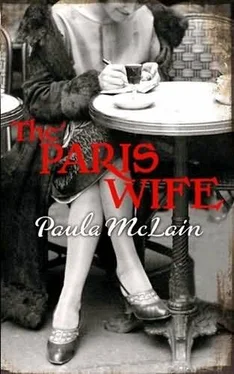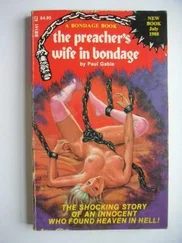“It only hurts to wait.”
“The waiting helps you boil it down. That’s essential, and the hurting helps everything along in its way.”
Ernest put this wisdom in his pocket the way he did everything Pound said.
Soon enough, the light began to change in the streets in the late afternoon, thinning and waning, and we started to wonder if we had it in us to face the long winter.
“I’ve been thinking about writing to Agnes,” Ernest said to me one evening. “It’s been on my mind since Milan. Do you mind?”
“I don’t know. What do you want out of it?”
“Nothing. Just for her to know I’m happy and thinking of her.”
“And that your career is going just as you said it would.”
He smiled. “That’s the cherry on top, is all.”
“Send your letter.”
“Yes,” he said. “I already have.”
I felt a flare of jealousy. “You were so sure I wouldn’t mind?”
“Maybe. But if you did, I knew I could make you see it was all right. It’s just a letter, in any case, and we have each other.”
“That’s what Shakespear said the other night.”
“Shakespear? What does she know about love?”
“Maybe more than we do, because she doesn’t have it. She’s not in the thick of it.”
“That’s why I can’t write about Paris now, because it’s everywhere.”
“So you write about Michigan.”
“It feels so close. As if I could never lose it.” He’d been reading over the day’s work from a notebook on the table in front of him. He rested his hand on the pages, his fingertips brushing over the boldly slanted sentences. “But it’s not just the real place. I’m inventing it, too, and that’s the best part.”
Over his writing desk he’d pinned a pale blue map of northern Michigan, and all the essential places were there-Horton Bay, Petoskey, Walloon Lake, Charlevoix-the precise locations where important things had happened to him, Ernest, but also to Nick Adams. Ernest and Nick weren’t the same guy, but they knew a lot of the same things, like where and when to look for bait hoppers heavy with dew, and how the water moved and what it told you about where the trout were. They knew about mortar shelling in the middle of a still night, and what it felt like to see a place you’d loved burned down and hollowed out and changed. Nick’s mind wasn’t altogether right and you could sense the pressure coming up inside him, in a story like “Big Two-Hearted River,” though Ernest never had him look at it directly or name it.
“I love your Michigan stories,” I said.
He squinted at me through the lantern light, across the table. “Is that true?”
“Yes, of course.”
“Sometimes I wonder if you want me writing at all. I think it makes you feel lonely.”
“It’s not the writing that makes me lonely, it’s your being gone. It’s been so long since you’ve even tried to write here at home. Maybe it would work now and I could see you. I wouldn’t have to talk or disturb you.”
“You know I need to go away to make anything happen.” He closed the notebook and put his pencil on top, rolling it back and forth with his fingertips. “I have to be alone to get it started, but if I really was alone, that wouldn’t work either. I need to leave that place and come back here and talk to you. That makes it real and makes it stick. Do you get what I’m saying?”
“I think so.” I walked behind him and put my head on his shoulder, rubbing my face into his neck. But the truth was I didn’t, not really. And he knew.
“Maybe no one can know how it is for anyone else.”
I straightened and walked over to the window where the rain came down in streams and pooled on the sill. “I’m trying.”
“Me too,” he said.
I sighed. “I think it’s going to rain all day.”
“Don’t kid yourself. It’s going to rain for a month.”
“Maybe it won’t after all.”
He smiled at me. “All right, Tiny. Maybe it won’t.”
Near Thanksgiving 1922, the Star sent Ernest to cover a peace conference in Lausanne that would decide the territorial dispute between Greece and Turkey, the thing that had started the terrible business at Smyrna and had generally kept them killing each other for the better part of three years. When the cable came, I saw Ernest’s nervousness. He almost couldn’t open it and I knew why. We couldn’t take another fight like the last. We might not survive it.
“Lausanne,” he said finally. “We have the money. You’ll come, too.”
“I needn’t,” I said. “I can be good.”
“No,” he said. “I want you there.”
I was relieved he’d insisted and agreed to go-but by the time the trip was launched, I was sick in bed, my head stuffed and aching. I couldn’t eat anything without retching. We decided he would go alone, and that I would join him when I could travel. My old friend Leticia Parker from St. Louis happened to be coming through Paris just then, and she said she wanted to visit every day and take care of me when Ernest was gone. It wouldn’t be like his time in Turkey at all, or even like Genoa.
By the time I felt well enough to join him, it was early December. I packed happily, knowing that when the conference was over and the reporting done, we’d have a long skiing holiday at Chamby and have Christmas there with Chink and then go on to Italy and Spain. All in all, we wouldn’t be back in Paris for four months, and I was ready for a nice long break from the cold and dampness. I hadn’t been out of bed for a week and wasn’t sure I’d have the energy for skiing, but I was damned well going to try.
Along with the travel plans passing back and forth between us, Ernest had also cabled to say that Lincoln Steffens, one of the journalists he’d met in Genoa, was in Lausanne and highly impressed with his dispatches. He wanted to see everything Ernest had written so far, but he only had one thing with him, “My Old Man,” a story about a boy and his ruined jockey father. Steffens thought the story was wonderful and compared it to Sherwood Anderson. Ernest didn’t like being compared to anyone, and it seemed worse, somehow, that it was Anderson, a friend and champion, but it helped that Steffens had offered to send the story on to an editor friend at Cosmopolitan . Ernest had one published piece at that point, in a small art magazine out of New Orleans called the Double Dealer . There was only that, and the promise from Pound about printing something for Three Mountains. This was much more promising, thrilling even.
As I packed my big suitcase, I thought about how long we’d be gone, and how anxious Ernest would be to return to his stories and the novel. It went without saying that he’d like to show more of his work to Steffens, so I headed for the dining room, to the cupboard where Ernest kept all his manuscripts. I gathered everything together and packed it in a small valise. This was my surprise for him, and I felt buoyed by it as I left the apartment for the Gare de Lyon.
The station was busy, but I had never seen it any other way. Porters scrambled by in their red jackets-past the waxed wooden benches and the ornamental palms and the well-dressed travelers headed home or away with anticipation. By morning, I would be with Ernest again and all would be well, and this was my only thought as I moved through the station and handed my bags to a porter. He helped me onto the train, put the big suitcase with my clothes on the rack up high, and placed the small valise under my seat, where I could reach it. The train was nearly empty. We had half an hour before departure, so I went to stretch my legs and get a newspaper. I threaded through the station, past the vendors with their apples and cheese and Evian water, the rented blankets and pillows and warm wrapped sandwiches and little flasks of brandy. When the conductor called for boarding I hurried onto the train with the stream of passengers and found my compartment just as it was before. Except for the small valise.
Читать дальше












